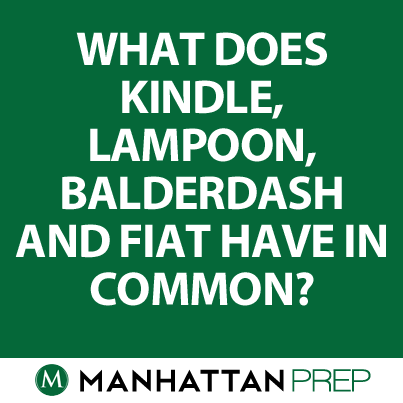Most Common GRE Vocabulary Words

The most common GRE vocabulary words are rare but reasonable. The vocab questions don’t test the simplest GRE Vocabulary words, like cat or go. They also don’t test the hardest GRE Vocabulary words, like conodont or acnestis. The words tested on the GRE fall between these two extremes. They aren’t words that you see every day, but you’ll eventually run into them if you read plenty of high-quality writing—which is one thing the GRE is testing for! Read more
GRE Vocabulary Words that Change the Whole Sentence

You can attend the first session of any of our online or in-person GRE courses absolutely free. Crazy, right? Check out our upcoming courses here.
Let’s take a look at some of the most useful GRE vocabulary words. These words don’t look that important on their own, but they can reverse the meaning of an entire phrase or sentence! Get started by trying out this GRE Text Completion question: Read more
Brand New: GRE Vocab in Brand Names
 I have a confession: I really don’t like learning vocab. I’m also not particularly good at learning it. So to score in the 99th percentile on the GRE, I really had to pull out all the stops.
I have a confession: I really don’t like learning vocab. I’m also not particularly good at learning it. So to score in the 99th percentile on the GRE, I really had to pull out all the stops.
Sometimes you’ll see a GRE word that you recognize, but won’t know what it means. If you recognize it as a brand name, but don’t know what it means, chances are it means something good: most brands don’t want to be named after something bad. (There are certainly exceptions: the website Gawker comes to mind.)
Here are 15 GRE words that are also brand names. Sometimes the brand name comes from the definition, and sometimes not. But maybe associating them with their brand will help you remember what they mean!
1. Kindle. To kindle something means to spark it, or light it on fire. You probably already know the word “kindling”, but if not, think of the Kindle e-reader, designed to spark your imagination with all your reading at your fingertips.
2. Hedonism. A hedonist is someone who seeks out pleasure. It’s often associated with the ideas of being overly focused on pleasure, particularly in relation to physical pleasure. A quick glance at the web page of Hedonism Resorts, an adults-only all-inclusive Carribbean resort with devil horns on its logo, might help you remember this word.
3. Lampoon. National Lampoon mocks things. It makes fun of them. The magazine has spun off movies such as “Animal House” and “National Lampoon’s Christmas Vacation”. Hopefully that will help you remember that to “lampoon” something means to make fun of something with sarcasm.
4. Intrepid. Intrepid means fearless. It describes an adventurer. So it makes sense that Dodge would want to name a car after that characteristic, considering other Dodge models include the Avenger, Challenger, Charger, and Journey. (The name Dodge itself is a family name – otherwise it would be a pretty odd choice for a company so interested in naming things after bravery.)
5. Amazon. Probably everyone knows Amazon as an online marketplace (and, of course, as a huge forest in South America). Jeff Bezos has said that he chose the name Amazon in part because he wanted his store to be “exotic and different” like the Amazon itself. The word Amazon refers to a strong, statuesque woman, as it was the mythological name of a group of women warriors. The forest is named Amazon because of the women who fought in battle there, but thinking of the website Amazon might help you think of something powerful and strong.
6. Balderdash. Balderdash is a pretty well-known board game where players must make up definitions of words and try to trick other players into voting for their definition over the real one. It’s well-named, as “balderdash” means nonsense. That’s exactly what the game has everyone writing!
7. Fiat. Another car makes the list. A fiat, by definition, is a decree. It’s often applied to an authorization of power. Fiat is a large Italian automobile manufacturer, and while the name wasn’t intended this way (it’s actually an acronym for Fabbrica Italiana Automobili Torino), I use the brand name to help me remember that the word means a decree. Maybe your fancy Italian car is a decree of your power, and your ability to do what you want because you say so.
8. Bazaar. Bazaar is a popular women’s fashion magazine, showcasing the best products from around the world. That may help you to remember that a bazaar is a large market with all kinds of eclectic and interesting offerings.
9. Fidelity. Fidelity means faithfulness and loyalty. What better name would you want for a bank? Even better, Fidelty’s advertisements use the full name, “Fidelity Bank and Trust”. Getting the word trust in there really helps cement the link in your brain.
10. Pedigree. Even if you’ve never purchased dog food, you probably know that Pedigree is a brand of dog food. It’s also a way of marking an animal as purebred through its ancestry records. Your pedigree is your lineage – in layman’s terms, a measure of how fancy you are. What a good name for a food product that’s marketed as a high-quality item for beloved pets.
11. Prudential. Here’s another well-named “Bank and Trust”! Prudential, like prudent, means making good and careful decisions, particularly relating to money or business. Who wouldn’t want a bank that does that?
12. Hallmark. Hallmark has worked very hard to remind us, with its gold crown stamp, that Hallmark is the type of card you send “when you care enough to send the very best.” A hallmark is technically a stamp on something showing its quality, but has evolved to mean any literal or figurative mark of quality. In other words, that gold crown stamp is the hallmark of an overpriced greeting card.
13. Finesse. Do you have finesse? I don’t, in life, but I do under my sink. Finesse is a brand of shampoo and other hair products designed to be delicate on hair and create beautiful results. To have finesse means to have a delicate, subtle, or refined manner in doing something.
14. Nirvana. Some of you didn’t go to high school in the 1990s, but for those of us who did, the word “Nirvana” is more synonymous with Kurt Cobain than Buddhism. Cobain reportedly picked the name because he wanted something “kind of beautiful or nice or pretty”. Nirvana is a transcendent state free of suffering, free of worldly worries and is often used on the GRE as a synonym for peace. When Nirvana frontman Cobain committed suicide in 1994 after a long battle with depression, the name took on an eerie meaning for many fans.
15. Essence. Our second magazine on the list, “Essence” is a magazine for African-American women. The essence of something is the indispensable quality that determines its character: the abstract or special quality that makes something what it is. It makes sense that a women’s magazine which set out to empower, inform, and entertain might want to remind its readers of the intrinsic, unique quality that makes them who they are.
What other brand names help you to remember GRE definitions? Share them in the comments — and be sure to like us on Facebook for more GRE fun!
Potent Quotables: Ten Famous Quotes Full of GRE Vocab
 I’m always on the search for fun and new ways to learn GRE Vocab. Well, “fun” might not be the right word, but learning vocabulary is easier when it is tied to things you already know and integrated into your daily life. If you can tie vocabulary to movie clips, song lyrics, other words you already know, or anything else that’s already stored in your memory, you can often remember the definition forever in a quick and easy way.
I’m always on the search for fun and new ways to learn GRE Vocab. Well, “fun” might not be the right word, but learning vocabulary is easier when it is tied to things you already know and integrated into your daily life. If you can tie vocabulary to movie clips, song lyrics, other words you already know, or anything else that’s already stored in your memory, you can often remember the definition forever in a quick and easy way.
Here are ten famous quotes, either that you may already know or that you may find easy to remember, that can help you remember GRE Vocab words.
- Alacrity. Ambrose Bierce famously said, “He who thinks with difficulty believes with alacrity.” It’s an astute observation, concisely put, and makes quite a beautiful and poetic insult. It also helps you understand that alacrity means “brisk and cheerful readiness.” Try recalling this quote to describe someone it fits, whether to yourself or to someone else. It might just stick.
- Prosaic. You probably know the phrase “poetry and prose”; where something poetic is beautiful and flowery, something prosaic is practical and direct. When Stendhal said, “It is better to have a prosaic husband and to take a romantic lover,” he was setting up a great GRE Vocab learning sentence that not only shows that “prosaic” and “romantic” are opposites, but helps us understand the nuanced meaning of each word.
- Loquacious. “Loquacious” is in the GRE’s rather large toolkit of words that mean “talkative.” Here’s a quote for reflection: Lucius Annaeus Seneca wrote, “Light griefs are loquacious, but the great are dumb.” Another great vocabulary learning sentence, as it clearly sets “loquacious” as the opposite of “dumb.”
- Veracity. Veracity means truth. “Truth in spirit, not truth to the letter, is the true veracity,” wrote Robert Louis Stevenson. This is a great quote to have on hand when you get in trouble for not-quite-following the rules. It’s also a good one for remembering the definition of “veracity.”
- Paucity. Because paucity isn’t a word we often use, it’s often hard to envision it in a sentence. Consider Norman Miller’s quote, “The horror of the twentieth century was the size of each new event and the paucity of its reverberation.” It’s a thoughtful point, and it helps us remember the structure “paucity of (usually some good quality in noun form) ”.
- Maintain. Sure, we encounter the word “maintain” pretty much every day. But as GRE Vocab is wont to do, it often tests the second definition of maintain, which is to assert. Think of Dostoyevsky’s words, “What is hell? I maintain that it is the suffering of being unable to love.” That statement was his assertion, and whether you maintain that it’s true, it might help you remember the definition of “maintain.”
- Contrition. Here’s a word that’s mostly used today in religious contexts, for it means a feeling of remorsefulness and penitence. Its adjectival form is “contrite,” which is tricky because it sounds like it might mean “not trite.” I find it easier to remember the noun form of contrition. Here’s a helpful quote: “To err is human; but contrition felt for the crime distinguishes the virtuous from the wicked,” said Vittorio Alfieri. This quote helps convey the seriousness and meaning of contrition.
- Extant. “Extant” is a GRE Vocab favorite that I think I can confidently say I’ve never heard a person actually use when speaking, except in GRE class. Extant means existent, which is the word most of us would use in its place. Thoreau famously said, “There is always a present and extant life, be it better or worse, which all combine to uphold.” I find that the phrase “present and extant” sticks with me to help me recall this definition without much work.
- Egregious. I’m going to let Kurt Vonnegut explain this one, as he did in Deadeye Dick. “Egregious. Most people think that word means terrible or unheard of or unforgivable. It has a much more interesting story than that to tell. It means ‘outside the herd.’ Imagine that—thousands of people, outside the herd.” He’s right on both fronts. While the word “egregious” technically means “outside the herd,” it has taken on a bad connotation—standing out for doing something wrong.
- Capricious. The definition of this word has been with me since my mother explained that Capricorns are born in January, named for the god of Janus, who has two faces. (Maybe we just figured out why I’m a GRE teacher.) Capricious means fickle or two-faced, of two minds at once. If your mom wasn’t quite so vocabulary inclined, consider this quote from Benjamin Disraeli: “A consistent man believes in destiny; a capricious man in chance.”
Unlike Disraeli, I don’t believe that a consistent man believes in destiny, necessarily; at least not when it comes to the GRE. The consistent among us, men and women alike, know that careful study can always improve your GRE score! For these, and other GRE Vocab words, download our free GRE flashcards. ?
See that “SUBSCRIBE” button in the top right corner? Click on it to receive all our GRE blog updates straight to your inbox!